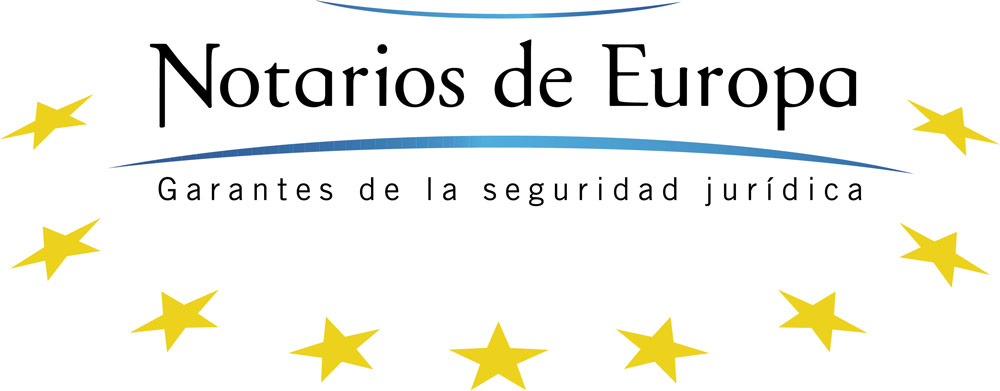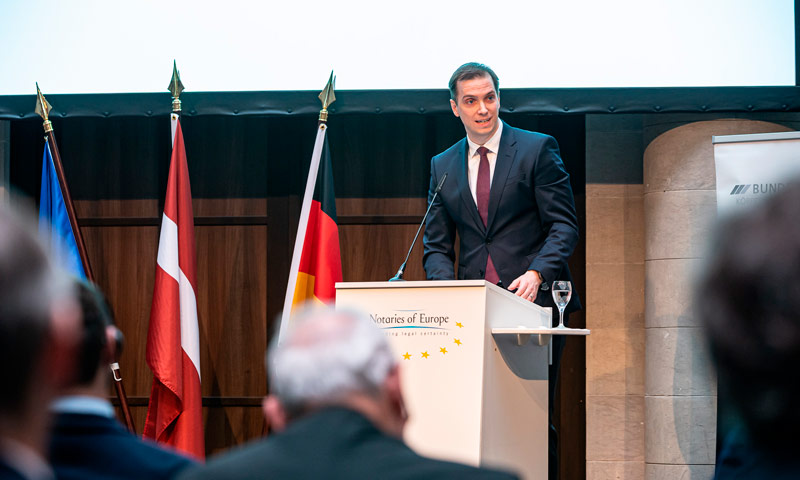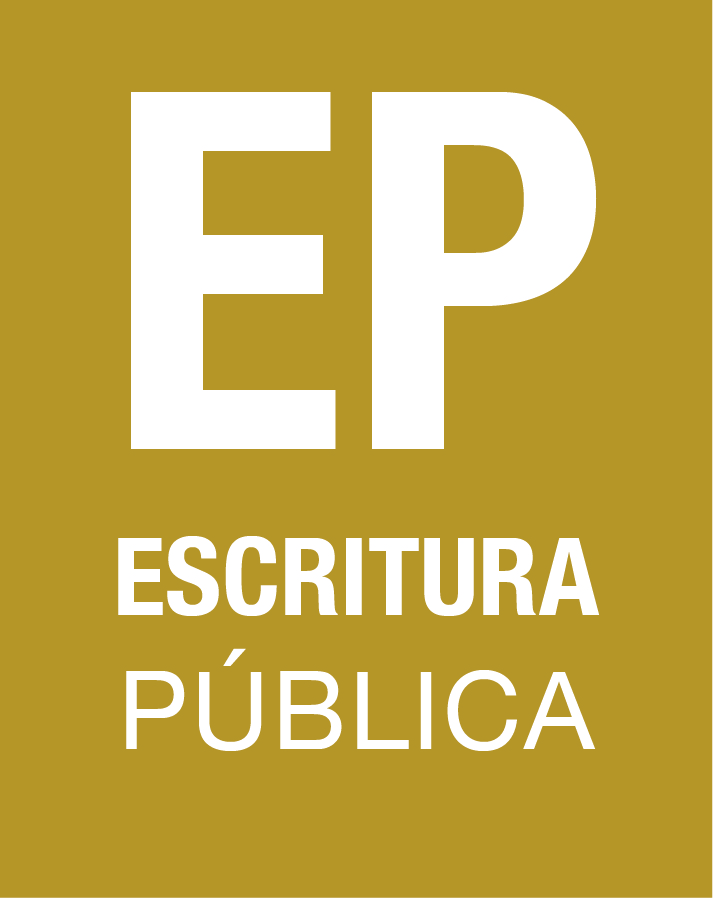ÁMBITO EUROPEO
Peter Stelmaszczyk,
presidente del Consejo de los Notariados de la Unión Europea (CNUE)
president of the Council of the Notariats of the European Union (CNUE)
"El CNUE debe contribuir al restablecimiento de un sistema jurídico eficaz en Ucrania"
“The CNUE should contribute to the reestablishment of an effective legal system in Ukraine”
JOSÉ M. CARRASCOSA
- Mail: [email protected]
- Twitter: @JMCarrascosa

Tras los mandatos de sus compatriotas Vaasen, Götte y Kohler; Peter Stelmaszczyk es el cuarto notario alemán al frente del CNUE, en el 30 aniversario de la institución. El nuevo presidente de los 26 notariados miembros expone en Escritura Pública los retos de mandato.
¿Cómo enfoca su legislatura?
La cooperación con las instituciones europeas estará en el centro de mi mandato. Se están debatiendo numerosos proyectos jurídicos y se espera que concluyan antes de las elecciones al Parlamento Europeo de 2024. Entre ellos, el nuevo paquete legislativo en materia de blanqueo de capitales, la anunciada iniciativa sobre la protección de los adultos vulnerables y la digitalización del Derecho de sociedades. Además, el apoyo al notariado ucraniano será uno de los ejes fundamentales de nuestro trabajo.
La presidencia de su predecesor, Giampaolo Marcoz, será recordada, entre otras cosas, por el apoyo unánime al Notariado ucraniano y a su presidente Marchenko, otorgando al país la condición de miembro observador del CNUE. ¿Cuáles son las medidas presentes y futuras que adoptará para mantener este apoyo?
La guerra en Ucrania está poniendo a prueba el sistema jurídico del país. Muchos notarios están heridos o han muerto. De los 6.600 notarios que hay en el país, solo 2.600 siguen ejerciendo su profesión. Estamos trabajando estrechamente con nuestros colegas ucranianos para que el sistema de administración preventiva de justicia siga funcionando, a pesar de estas dramáticas circunstancias. Apoyamos a los notarios a través de dinero, alojamiento y necesidades básicas. Además, trabajamos juntos en asuntos legales. Sin embargo, queremos ir más allá de ser un ‘Plan Marshall’ para la reconstrucción de Ucrania. El CNUE debe contribuir al restablecimiento de un sistema jurídico eficaz en el país. La garantía del derecho de propiedad, la resolución legal de los procedimientos familiares y sucesorios o la reparación de los registros públicos serán condiciones necesarias para una reconstrucción basada en el Estado de Derecho.
En 2019 se aprobó una directiva comunitaria sobre la constitución telemática de sociedades, que incluía a los notarios como parte del sistema. ¿Existen otras iniciativas europeas en este ámbito?
La digitalización del Derecho de Sociedades será una de nuestras tareas más importantes para 2023. La Comisión Europea está trabajando actualmente en una nueva iniciativa para una directiva que amplíe y mejore el uso de las herramientas y los procedimientos digitales en este ámbito. La publicación de la propuesta está prevista para finales de marzo.
Sin embargo, los países europeos tienen sistemas de registro muy diferentes. En la mayoría, los notarios actúan como guardianes que comprueban la exactitud de toda la información antes de su inscripción en el registro. Los notarios europeos proponen un enfoque ascendente que anime a los Estados miembros a establecer registros más fiables. Por eso, apoyamos plenamente la propuesta de la Comisión Europea de aumentar la transparencia transfronteriza a través del denominado BRIS (Business Registers Interconnection System) y de incrementar las normas de control previo para los registros mercantiles. Esta es la postura que pretendo promover ante las instituciones europeas.
«LA LABOR DEL NOTARIADO ESPAÑOL EN LA LUCHA CONTRA EL BLANQUEO DE CAPITALES ES UNA REFERENCIA PARA TODOS LOS NOTARIADOS EUROPEOS»
El Notariado español es considerado como un referente en la lucha contra los delitos económicos. Dos de sus miembros, Ignacio Gomá (en los últimos seis años) y Juan Kutz (desde principios de 2023), han dirigido el Grupo de Trabajo contra el Blanqueo de Capitales del CNUE. ¿Cree que el modelo español se puede exportar a otros notariados?
La labor del notariado español en la lucha contra el blanqueo de capitales es una referencia para todos los notariados europeos. Estos proyectos de referencia son importantes cuando hablamos con las instituciones comunitarias, ya que ponen de manifiesto el importante papel del notario como funcionario público y colaborador del Estado en la lucha contra el blanqueo de capitales. La concienciación de esta función notarial ante las instituciones europeas es crucial para el trabajo del CNUE en relación con el paquete legislativo que se está debatiendo. Estoy deseando trabajar con Juan Kutz como nuevo presidente de su grupo de trabajo.
Las instituciones comunitarias están trabajando en una revisión del Reglamento eIDAS para la implantación de un sistema europeo de identificación digital. ¿Cómo está colaborando el CNUE para implantar estas soluciones sin menoscabar la necesidad de seguridad jurídica?
El CNUE está siguiendo de cerca las negociaciones sobre la revisión del reglamento eIDAS, que debería proporcionar la nueva base para una identificación digital transfronteriza y segura. ¡Apoyamos firmemente este objetivo! Muchos notariados ya han previsto un proceso de identificación en dos pasos para sus nuevos procedimientos en línea. De esta forma, la identificación realizada por los notarios en el ámbito digital puede cumplir también con los más altos estándares de seguridad.
Los Notariados alemán y español han sido los impulsores de la plataforma EUDoc que permite el intercambio seguro de copias electrónicas entre notarios de distintos países de la UE. ¿En qué situación se encuentra este proyecto?
EUDoc es una solución informática desarrollada por la española ANCERT (la Agencia Notarial de Certificación), que permitirá a los notarios transmitir documentos electrónicos de forma segura. Con EUDoc, los notarios europeos ocuparían un lugar clave a la hora de configurar los desarrollos futuros en el ámbito de la digitalización. Trabajamos conjuntamente con el notariado español para que EUDoc se convierta en un proyecto al que pueda unirse cualquier notariado europeo en cualquier momento. A lo largo de 2022 hemos organizado intercambios con otros miembros para identificar necesidades prácticas y financieras, así como posibles obstáculos técnicos y jurídicos. Continuaremos este diálogo en 2023.
DE LOS 6.600 NOTARIOS QUE HAY EN UCRANIA, SOLO 2.600 SIGUEN EJERCIENDO SU PROFESIÓN
Ha trabajado como abogado en un gran bufete. ¿Qué le motivó a convertirse en notario? ¿A qué retos se enfrenta un joven notario en Europa?
Como notario, valoro especialmente la contribución que hacemos al buen funcionamiento de la sociedad. El notario desempeña una importante función de asesoramiento jurídico imparcial e independiente. Aconsejaría a un joven notario que aprenda otros idiomas y amplíe sus conocimientos de Derecho internacional privado y de otros sistemas jurídicos.


After the terms of your compatriots Vaasen, Götte and Kohler, Peter Stelmaszczyk is the fourth German notary to head the CNUE, on the 30th anniversary of the institution. The new president of the 26 member notaries sets down in ESCRITURA PÚBLICA the challenges of mandate.
How are you approaching your legislature?
Cooperation with the European institutions will be at the heart of my mandate. Many legal projects are under discussion and are expected to be concluded before the European parliamentary elections in 2024. These include the new legislative package on anti-money laundering, the announced initiative on the protection of vulnerable adults and the digitalisation of company law. In addition, support to the Ukrainian notariat will be one of the cornerstones of our work.
The presidency of your predecessor, Giampaolo Marcoz, will be remembered, among other things, for the unanimous support of the Ukrainian Notariat and its President Marchenko, granting the country the status of CNUE observer member. What are the future and ongoing steps you will take to maintain this support?
The war in Ukraine is putting the country’s legal system to the test. Many notaries are injured or dead. Of the 6600 notaries in the country, only 2600 are still practising. We are closely working with our Ukrainian colleagues to keep the system of preventive administration of justice working, despite these dramatic circumstances. We support notaries through money, accommodation and basic necessities. In addition, we work together in legal matters. However, we want to go further to be a “Marshall Plan” for the reconstruction of Ukraine. The CNUE should contribute to the restoration of an effective legal system in the country. The guarantee of the right to property, the lawful settlement of family and succession proceedings, or the restoration of public registers will be necessary conditions for a reconstruction based on the rule of law.
In 2019, a Community directive on the remote electronic incorporation of companies was approved, which included notaries as part of the system. Are there other European initiatives to come in this area?
The digitalisation of company law will be one of our most important tasks for 2023. The European Commission is currently working on a new initiative for a directive to extend and improve the use of digital tools and processes in this area. The publication of the proposal is announced for the end of March. However, European countries have very different registry systems. In most of them, notaries act as gate-keepers who check all information for accuracy before it is entered in the register. European notaries instead propose a bottom-up approach to encourage Member States to establish more reliable registers. That is why we fully support the European Commission’s proposal to increase cross-border transparency via the so-called BRIS (Business Registers Interconnection System) and to increase the ex ante control standards for business registers. This is the position I intend to promote vis-à-vis the European institutions.
THE WORK OF THE SPANISH NOTARIAT IN COMBATING MONEY LAUNDERING IS A REFERENCE FOR ALL EUROPEAN NOTARIATS
The Spanish Notariat is considered a benchmark in the fight against financial crimes. Two of its members, Ignacio Gomá (for the past six years), and Juan Kutz (since early 2023), have led the CNUE Anti-Money Laundering Working Group. Do you think the Spanish model can be exported to other notariats?
The work of the Spanish notariat in combating money laundering is a reference for all European notariats. Such benchmark projects are important, when we talk to the Community institutions, as it shows the important role of notaries as public officials and partners of the State in the fight against money laundering. Raising awareness for this notarial function vis-à-vis the European institutions is crucial for the CNUE’s work on the legislative package currently under discussion I am looking forward to working with Juan Kutz as the new chair of the working group.
The Community institutions are working on a revision of the eIDAS regulation for the implementation of a digital European identification system. How is the CNUE collaborating to implement these solutions without undermining the need for legal certainty?
The CNUE is closely following the negotiations on the revision of the eIDAS regulation, which should provide the new basis for a cross-border and secure digital identification. We strongly support this objective! Many notariats have already provided for a two-step identification process for their new online procedures: Thus, identification carried out by notaries in the digital sphere can also meet the highest security standards.
The German and Spanish Notariats have been the drivers of the EUDoc plattform which allows the secure exchange of electronic copies between notaries from different EU countries. What is the status of this project?
EUDoc is an IT solution developed by Spain’s ANCERT (Notarial Agency of Certification), whichwill allow notaries to securely transmit electronic documents. With EUDoc, European notaries would gain a key position in shaping future developments in the field of digitalisation. Together with the Spanish notariat, we are working to ensure that EUDoc becomes a project, which can be joined by any European notariat at any time. Throughout 2022, we organised exchanges with other members to identify practical and financial needs, as well as possible technical and legal obstacles. We will continue this dialogue in 2023.
OF THE 6600 NOTARIES IN THE COUNTRY, ONLY 2600 ARE STILL PRACTISING
You have worked as a lawyer at a large law firm. What motivated you to become a notary? What are the challenges facing a young notary in Europe?
As a notary, I particularly appreciate the contribution we make to the proper functioning of the society. The notary has an important role to provide impartial and independent legal advice. I would advise a young notary to learn foreign languages and broaden his or her knowledge of private international law and other legal systems.



